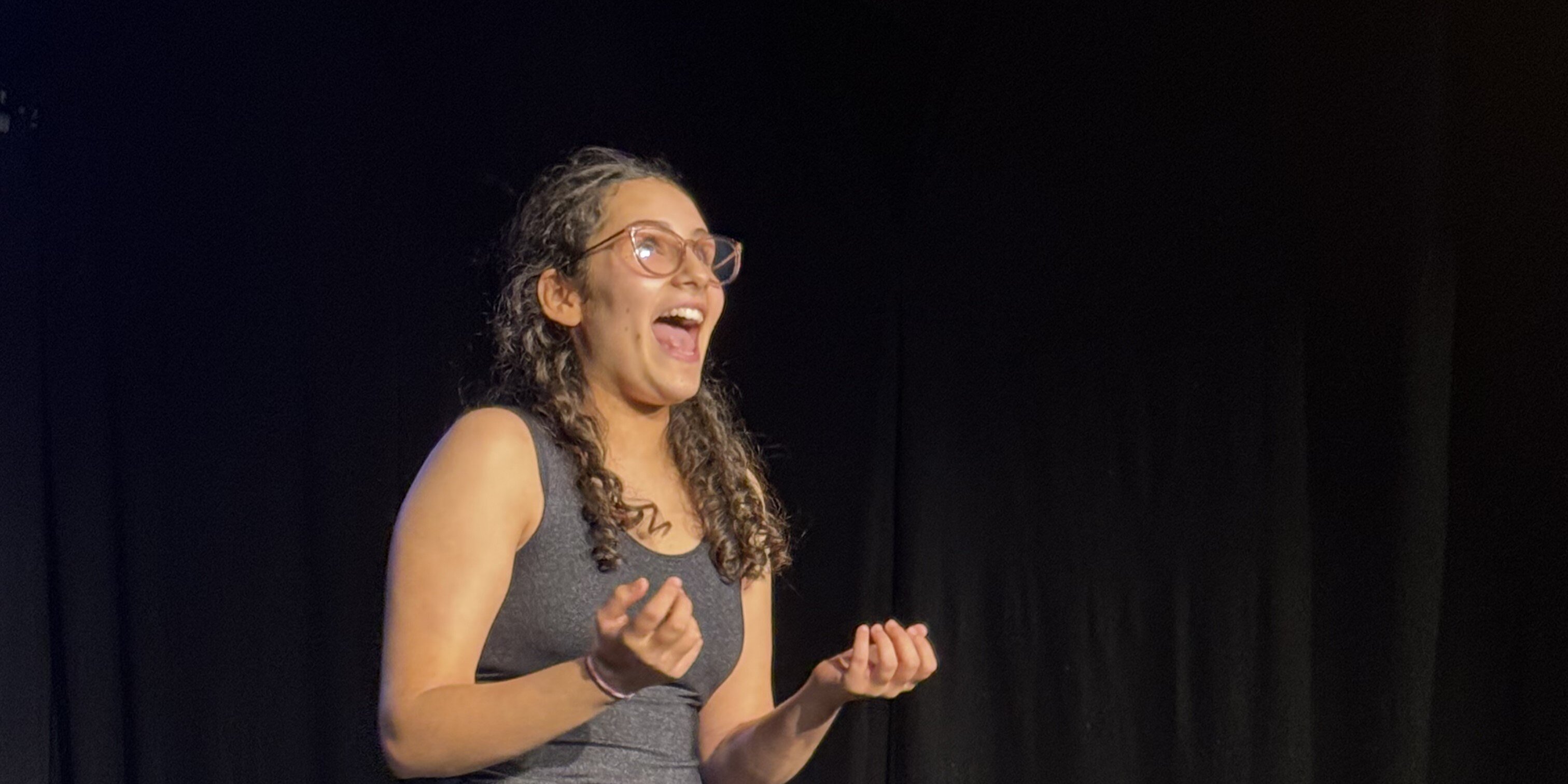
Building confidence and wellbeing through performing arts
BY: Guest Writer
04 June 2025
Big Red Curtain have been a Trinity Champion Centre since 2019, when the Champion Centre programme first started. They have offered a range of Trinity Drama exams for over a decade, with drama exams firmly embedded into their delivery. In this blog, Brenda Whitehead, Principal of Big Red Curtain (BRC), highlights the importance of performing arts to mental health and wellbeing.
‘Your theatre school literally saved her, so thank you!’
This may seem like quite an opening statement, but this is genuine feedback we received from one of our student’s parents. While this may seem surprising, over the last few years we have seen a sharp decline in the mental health of some of our students, and, whilst of course I cannot take credit for ‘saving’ any student, it is a privilege to know that we have often played a huge part in their recovery. I feel that we have a purpose and a duty to help develop skills for the future that benefit not only students mental health but their general wellbeing.
Attending our theatre school and participating in drama, musical theatre, and dance can help students to gain confidence, self-worth, and the reassurance of knowing that we as a team believe in them. Even more importantly, it can help them to believe in themselves.
Immersing themselves in the performing arts can allow students to be themselves and express themselves, if only for three hours a week. Acting, for example, can release them into another world, taking students away from the mundane and ordinary, and giving them an outlet to tell their story perhaps through different characters.
However, some students may struggle initially to engage or build their confidence. Or occasionally students may join our theatre school not because of a love of the performing arts but because their parent has suggested it, believing it will help their child’s social anxiety and expand their friendship group. Above everything else we want students to enjoy their experience and so there are some steps we will take to help students settle in and feel part of a team.
For all students who attend a trial session we offer a ‘buddy’ for their first session who can offer them practical help and talk to them if they are anxious or nervous. This can help them overcome the initial fear of joining a group and trying a new activity.
We also try to pair new students with established students who can act as a mentor. We frequently begin sessions by introducing and mixing age groups and asking them to work together to, for example, devise a group drama scene. We find that being involved in a group environment helps the new students settle in and reduces any feelings of anxiety they may have about being placed under a spotlight, which they are perhaps not ready for at the beginning of their performing arts journey. It is important not to put them on the spot and ask them to perform a solo- that has to come from them when they feel comfortable and suitably settled.
If a student really struggles to integrate we have sometimes asked other students to help. For instance, one young person would refuse to sit with their peer group or chat to fellow students and I asked another student to help. They asked the struggling student if they would help them with something and, miraculously, this worked - and gradually the student began to get involved and throw themselves into every situation.
We try to take time to check in with students on a one-to-one basis and encourage them to do this with one another. I have been asked on many occasions by a student in crisis ‘can I have a quiet word’ or ‘can I have a chat with you’ and it is really important that you make time to listen, and to be a voice of reason. Giving students the space and time they need really does mean the world to them and you never know quite how much this extended network can help and support them. It is also important to pass on any problems and discuss with parents’ whatever approaches you find work to help their child.
As the weeks progress and they begin to find friendships within their peer groups, and confidence grows, we divide our students not only by age but by ability, so we do not hold anyone back who wishes to perform or continue their training onward into a conservatoire or drama school post 18.
We will also try to select pieces to work on that everyone can relate to, and this can create conversation and interest from an otherwise shy student. Through their love of musical theatre or drama, students can find common ground with one another, and can engage in something worthwhile, with the prospect of a performance at the end.
Working towards a Trinity College London examination also gives students a goal and a sense of purpose, and of course achieving their exam helps tremendously in inspiring children who are less confident, as well as children with SEND, to believe in themselves. We also organise an annual awards presentation to celebrate the students’ exam success.
Over the last twenty-eight years I have witnessed how a shy, sad, nervous child can become a confident young person as a result of being involved in a caring and rewarding performing arts environment where, in their words, they can be ‘me!’ As one of our long-time students said about their time at our theatre schools:
‘BRC is a welcoming community where everyone makes an effort to witness and help each other succeed through musical theatre and drama and also generally as people. While suffering with my mental health through my teenage years, spending time in a supportive environment where I have formed strong friendships and can express myself has been extremely helpful. Additionally, after the covid-19 lockdown, BRC has helped me to rebuild my confidence and although this was challenging, I no longer recognise the person I was a few years ago.’




Comments & Replies